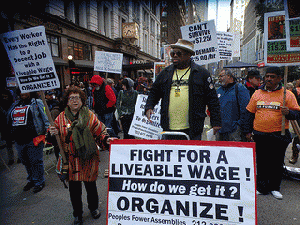We're once again caught up in a debate over the minimum wage. Although the wage has often been raised since it was first enacted in 1938, it was never indexed to inflation. Thus, as soon as Congress sets the wage, inflation immediately begins to erode its value and supporters must soon again fight conservatives to get an upward adjustment.
Congress last adjusted the minimum
wage in 2009, to $7.25. It reached its highest level in 1968 at $10.77
(in 2013 dollars). So today's wage is $3.52 less than in 1968. The 1968 wage
yielded an annual full-time salary that was above the poverty level for a
family of three, whereas the current wage yields an annual income below
the poverty level for a family of two ( Economic
Policy Institute ).
Congressional
Democrats have introduced the Fair Minimum Wage Act, which would raise the
federal minimum wage to $10.10 by 2016, and then index it to inflation. The
bill's prospects are bleak in the GOP-controlled House, and it's doubtful that
Senate Democrats could find five Republican votes to overcome a likely GOP
filibuster.
Two-thirds of Americans in a recent
ABC News/Washington Post poll support
increasing the minimum wage. The average recommended wage among these
supporters is $10.25, a little higher than the amount being proposed in the
Kentucky legislature and in Congress.
In spite of
this popular support, Republicans remain opposed to raising the minimum wage.
In addition to their reflexive hostility toward government intervention in the
market, they claim that raising the minimum price for labor will cause firms to
hire fewer unskilled and low-skilled employees. They support their argument with
a shallow interpretation of the Law of Demand--a fundamental principle in
economics.
This law
says: all else being equal, as the price of a product increases, quantity
demanded falls. Therefore, conservatives say, the higher the minimum wage, the
less employers will buy low-skilled labor. However, the facts don't support
this claim.
Over 600
economists, including eight Nobel laureates, have sent an open letter to the
President and congressional leaders in support of the Fair Minimum Wage Act. They
say that "the weight of evidence" now shows that "increases in the minimum wage
have had little or no negative effect on the employment of minimum-wage workers."
Why might this be?
Notice the very important proviso
in the Law of Demand: "all else being equal." Consider the effect of a minimum
wage hike on a fast-food restaurant where most employees work at or near the
minimum wage. How will the owner respond?
Perhaps she has found that people
willing (or desperate enough) to work at the minimum wage aren't
well-motivated, and don't keep their jobs for very long. She finds that
higher-paid workers are better, more productive ; and she doesn't have to spend
money and time constantly training new hires. She has learned what Costco
discovered: "You get what you pay for.
Costco pays their employees a livable wage and gets sales per employee
at double what Walmart subsidiary Sam's Club gets from their employees who work
for lousy pay" (Rick Ungar, Forbes , 4/17/2013).
Moreover,
since many potential customers have also received a wage increase and have a
bit more to spend, business increases at her restaurant. So, going back to the
proviso in the Law of Demand, "all else" was NOT equal. The growth in consumer demand
and employee productivity have made her business more profitable than it was
before, and she keeps all her employees.
For similar
reasons, Glenn Murphy, Chairman and CEO of Gap Inc., announced that his company
will make a "strategic investment" in its 65,000 employees by raising its
minimum wage to $9 in 2014 and to $10 in 2015. He said that this decision "will
directly support our business, and is one that we expect to deliver a return
many times over."
It turns
out that treating workers with respect and decency is also sound economics. As
Zeynep Ton explained in "Why "Good Jobs' Are Good for Retailers" ( Harvard
Business Review ), when retailers such as Trader Joe's and Costco "view
labor not as a cost to be minimized but as a driver of sales and profits, they
create a virtuous cycle. Investment in employees allows for excellent operational
execution, which boosts sales and profits, which allows for a larger labor
budget, which results in even more investment in store employees."
By opposing
a minimum-wage increase, Republicans are in effect arguing for a taxpayer-funded
government handout to companies paying minimum wages. For example, according to
the National Employment Law Project "the overwhelming share of jobs in the
fast-food industry pay low wages that force millions of workers to rely on
public assistance in order to afford health care, food, and other basic
necessities."
McDonald's and Walmart would lose
much of their workforce without this public assistance. Republicans are both
inconsistent and callous in arguing against a minimum wage increase while also
pushing for substantial cuts in food stamps and other welfare programs.
There is hypocrisy in their
professed concern over job losses from raising the minimum wage. They have
fastened on a Feb. 18 CBO report which states that the Fair Minimum Wage Act could result in 500,000
fewer low-wage jobs. However, this report also claims that the Act would raise
the salaries of 16.5 million people, and lift 900,000 above the poverty line.
(Note: You can view every article as one long page if you sign up as an Advocate Member, or higher).






